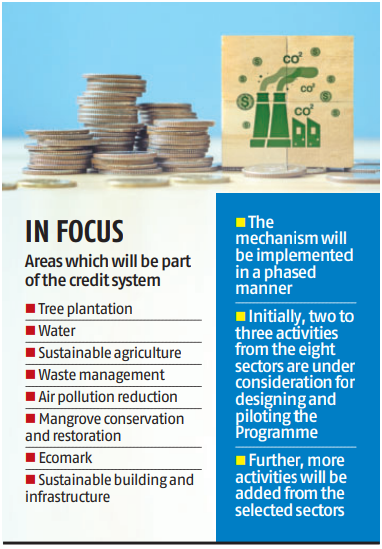ForumIAS announcing GS Foundation Program for UPSC CSE 2025-26 from 19 April. Click Here for more information.
ForumIAS Answer Writing Focus Group (AWFG) for Mains 2024 commencing from 24th June 2024. The Entrance Test for the program will be held on 28th April 2024 at 9 AM. To know more about the program visit: https://forumias.com/blog/awfg2024
Source: The post is based on the following articles
“Centre plans ‘market’ scheme to promote sustainable living” published in The Hindu on 29th June 2023.
“‘Green credits’ scheme launched for eco push” published in the Business Standard on 29th June 2023.
What is the News?
The Environment Ministry has issued a draft notification detailing a proposed ‘Green Credits Scheme’.
About the Green Credits Scheme

A Green Credit Programme is proposed to be launched at the national level.
Aim:
-To leverage a competitive market-based approach for Green Credits thereby incentivising voluntary environmental actions of various stakeholders.
-To encourage private sector industries and companies as well as other entities to meet their existing obligations by taking actions which are able to converge with activities relevant to generating or buying Green Credits.
Tradable: These credits, through a yet-to-be-specified mechanism, can also be traded for money.
Focus sectors: The notification lists out eight sectors, or activities, that can qualify for generating credits.
They include 1) tree plantation-based green credit to promote activities for increasing green cover through tree plantation and related activities; 2) water-based green credit to promote water conservation, water harvesting and water use efficiency/savings, including treatment and reuse of wastewater; 3) sustainable agriculture-based green credit to promote natural and regenerative agricultural practices and land restoration to improve productivity, 4) soil health and nutritional value of food produced; and 4) waste management-based green credit to promote sustainable and improved practices.
5) Air pollution reduction, 6) mangrove conservation and restoration-based green credit to promote measures for the conservation and restoration of mangroves, 7) Ecomark-based green credit encourages manufacturers to obtain eco-mark labels for their goods and services and 8) sustainable building and infrastructure-based Green Credit encourage the construction of buildings and other infrastructure using sustainable technologies and materials.
Priority: The government’s immediate priority was to “create supply (of green credits)” via voluntary actions and then “create demand by bringing in laws or rules that will incentivise companies and organisations to buy credits that can then be traded.”
Benefits: The scheme will incentivise a host of activities including afforestation programmes, water conservation, waste management and remedying air pollution by allowing individuals and organisations to generate ‘green credits”.
Concerns by experts: Unlike carbon markets, where only greenhouse gas emissions were traded, the Green Credit Scheme was “trickier” as it involved accounting for a wide range of actions. There are a few examples globally but nowhere in the world is such a wide range of actions considered.




